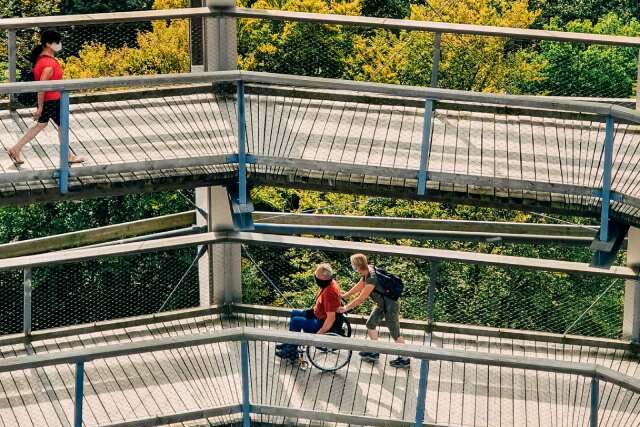Fewer travel programmes are catering for groups of travellers with additional needs compared to 2022. After what looked like an encouraging spike in the number of European travel and procurement managers claiming their travel programmes are built with special consideration for these travellers last year, new data from Business Travel Show Europe appears to show (apart from LGBTQIA+ travellers) they have fallen below 2022 levels…
LGBTQIA+ travellers
As we enter Pride Month on Saturday, more than half (54%) of the 141 European corporate travel and procurement managers participating in the survey admitted their programmes do not, in fact, cater for LGBTQIA+ travellers compared to 22% in 2023. A further 4% claim they would like to, but it’s too expensive. Just over a quarter (27% and little change from 26% in 2022) do look after LGBTQIA+ travellers and an additional 9% plan to. This was the only positive data point from the survey.
Travellers with accessibility needs
People with accessibility requirements (around 25% of the UK population is disabled) also appear to be less well catered for compared to 2023 – dropping from 48% to 43%.
Accessibility in travel is being debated at Business Travel Show Europe on Wednesday 19 June at 12pm with a panel session – Let’s make business travel truly accessible – when panellists from Maiden Voyage, EventWell and British Wheelchair Basketball will explain what travel managers can do to prioritise accessibility in their travel programme and where pressure needs to be applied to make the sector perform better as a whole.
Neurodivergent people
Despite accounting for around 15% of the UK population and 10% of the workforce in Europe, there’s an equally massive drop in the travel programmes providing consideration for neurodivergent people, from 39% to 18% though – again – this is less drastic when compared with 2022 (21%).
EventWell CEO & Founder Helen Moon: “The reasons for ensuring neuroinclusion in travel are vast. A minimum of 20% of travellers will be diagnosed with a neurodivergent cognitive difference, but the reality that there are an even higher number of travellers who are undiagnosed. Travel accommodations that benefit this community are well documented to benefit the mental wellbeing of ALL travellers, in the same way that drop curbs in pavements designed for individuals with physical disabilities also benefit everyone.
Accessibility and inclusion are about removing barriers to allow everyone equal opportunity to participate and engage. As a wider industry we have a duty of care to be supporting this, and it is vital component to the future of travel and events.”
Younger and older travellers with additional needs
For these two categories of traveller, the stats appear to show the number of travel programmes aligned with their needs has more than halved since last year. 26% compared to 54% for younger travellers. And 23% compared to 47% for older travellers. In 2022, these figures were 30% for younger travellers and 31% for older travellers.
Orthodox and Jewish travellers
Despite the ongoing conflict between Israel and Gaza, two thirds (67%) of travel programmes do not provide special considerations for Jewish travellers, with a further 7% claiming they are too small a community to justify the cost. The same stats apply to all orthodox religious travellers.
Carolyn Pearson, CEO &CIO, Maiden Voyage: “Whilst this survey reflects the current state, I don’t believe it is a true reflection of the ambition of travel managers and travel management companies because we are seeing unprecedented interest in building inclusivity into travel programmes particularly bearing in mind the changing dynamics of today’s workforce: upcoming generations are generally more ‘gender-fluid’, different life-stages (like the menopause) bring new challenges , we have an aging workforce where more people will be encumbered by growing accessibility needs, and all of this and more will need to be factored into travel programmes moving forward.”
QUESTION: Has your travel policy/programme been built with special consideration for travellers with additional needs?
| Yes 2024 | Yes 2023 | Yes 2022 | No – 2024 | No – 2023 | We plan to – 2024 | We plan to – 2023 | Too pricy – 2024 | It’s too expensive | |
| LGBTQIA+ | 27% | 43 | 26 | 54% | 22 | 9% | 23 | 4% | 10 |
| Solo women | 36% | 45 | 42 | 48% | 30 | 11% | 21 | 1% | 3 |
| Marginalised communities (faith, race, religion) | 23% | 50 | 31 | 59%
|
25 | 10% | 18 | 4% | 8 |
| People with accessibility requirements | 43% | 48 | 47 | 36% | 19 | 14% | 19 | 5% | 13 |
| Younger people | 26% | 54 | 30 | 62% | 21 | 7% | 19 | 0% | 2 |
| Older people | 23% | 47 | 31 | 62% | 21 | 8% | 25 | 1% | 6 |
| Neurodivergent people | 18% | 39 | – | 62% | 22 | 10% | 38 | 2% | 10 |
| Jewish Community | 13% | 67% | 7% | 3% | |||||
| Orthodox religious travellers | 15% | 67% | 7% | 9% | |||||
Business Travel Show Europe takes place between 19-20 June 2024 at ExCeL London with complimentary entry, conference programme and networking opportunities to qualified travel managers, buyers and bookers. The hosted buyer programme is also still accepting applications still.















